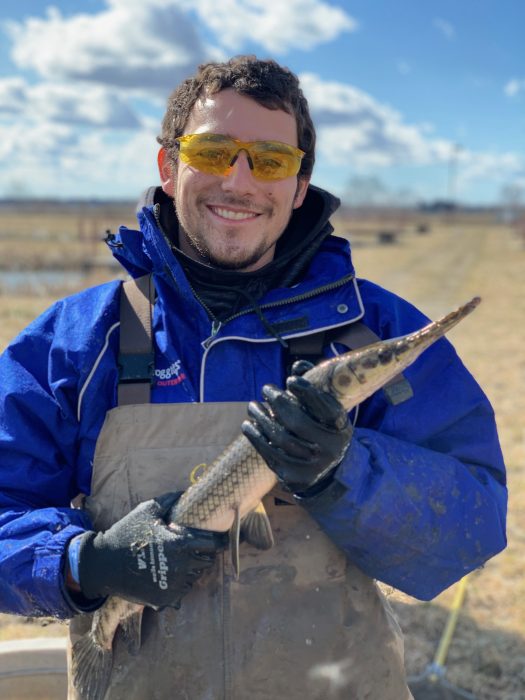 Spring has arrived in the northern hemisphere, bringing warming temperatures and activating wildlife as it creeps northward after the cold winter, pushing up into Illinois. Light March rain has damped the ground, where a variety of vegetation begins to sprout above, some daffodils and tulips even budding to herald the spring season. Male red winged blackbirds swoop over water bodies and perch atop last year’s cattail stems as they jostle for this year’s territory. Below, deep beneath the water’s bottom, American bullfrogs set in thick mud are beginning to stir from their winter slumber, readying themselves for emergence. After being nearly still for the winter, the fishes of Illinois also slowly ramp up activity; soon fishes of all different species will be feeding, competing, mating, and nesting in the wildlife crescendo that is the spring and summer. For the Sport Fish Ecology Lab at the Illinois Natural History Survey, this means the pond draining season is upon us.
Spring has arrived in the northern hemisphere, bringing warming temperatures and activating wildlife as it creeps northward after the cold winter, pushing up into Illinois. Light March rain has damped the ground, where a variety of vegetation begins to sprout above, some daffodils and tulips even budding to herald the spring season. Male red winged blackbirds swoop over water bodies and perch atop last year’s cattail stems as they jostle for this year’s territory. Below, deep beneath the water’s bottom, American bullfrogs set in thick mud are beginning to stir from their winter slumber, readying themselves for emergence. After being nearly still for the winter, the fishes of Illinois also slowly ramp up activity; soon fishes of all different species will be feeding, competing, mating, and nesting in the wildlife crescendo that is the spring and summer. For the Sport Fish Ecology Lab at the Illinois Natural History Survey, this means the pond draining season is upon us.
The SFEL at the INHS operates the INHS Aquatic Research Facility (INHS ARF) – a pond complex and research lab where studies are conducted on various sportfish of Illinois. From largemouth bass to bluegill to shortnose gar, the SFEL studies a variety of important Illinois sport fish and has the ability to hold them year-round in quasi-natural pond environments. The great utility of the ARF is the ability to drain and refill each of these ponds to periodically capture its entire fish population, which we can then utilize for experiments in the laboratory using our temporary, small-scale holding apparatus, or redistribute into one or more of our twenty-four ponds on the complex according to experimental design needs for reproductive crosses or growing juveniles to adulthood.
This season, we planned as a main objective to set up production of 2020 largemouth bass from all of the high and low vulnerability lines of Illinois largemouth bass established and maintained by INHS since the late 1970s. These bass have been selectively bred over many generations as a part of a long-term study on the existence and preservation of behavioral and genetic differences caused by Fisheries Induced Evolution in sportfish populations. Because largemouth bass reproduction takes place in during early spring (when water temperatures begin to exceed 15°C), it is imperative that we get an early start on draining and redistributing if we want to produce offspring of largemouth bass in the 2020 season.
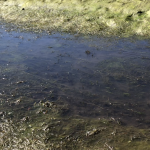 Our mission was to first drain and consolidate unneeded fish for the 2020 production into secondary ponds in order to establish a sufficient number of empty ponds for the largemouth bass production. We processed and relocated some beautiful gar from the Illinois River and some pumpkinseed, as well as some rainbow trout, leaving the main set of ponds on the complex for largemouth bass production. There are six different genetic lines to maintain when producing new generations in our largemouth bass. We needn’t get into the details of the different lines, but a preservation of each line, with a replicate backup, calls for twelve ponds needed in the setup of 2020 production. Many days of morning pond drainings and labored steps through deep muddy pond bottoms to recover fish proved successful. After draining most of our 2016 largemouth bass ponds, which we used as the parent generation, we acquired a sufficient number of fish to stock our desired production ponds.
Our mission was to first drain and consolidate unneeded fish for the 2020 production into secondary ponds in order to establish a sufficient number of empty ponds for the largemouth bass production. We processed and relocated some beautiful gar from the Illinois River and some pumpkinseed, as well as some rainbow trout, leaving the main set of ponds on the complex for largemouth bass production. There are six different genetic lines to maintain when producing new generations in our largemouth bass. We needn’t get into the details of the different lines, but a preservation of each line, with a replicate backup, calls for twelve ponds needed in the setup of 2020 production. Many days of morning pond drainings and labored steps through deep muddy pond bottoms to recover fish proved successful. After draining most of our 2016 largemouth bass ponds, which we used as the parent generation, we acquired a sufficient number of fish to stock our desired production ponds.
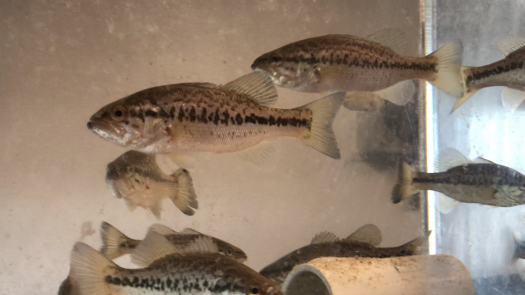 Of course, this year provided unprecedented circumstances in which to accomplish our research aims as well as deal with life itself. The emergence and spread of Covid-19 happened just as pond draining season was underway. As the brood of newly hatched largemouth bass seem like an exploding swarm in the small waters of our ponds, so too has Covid-19 exploded onto our world and swarmed our communities. The virus notwithstanding, we were able, with speed and determination, to finish our efforts just in time. Throughout the month of March, we at the Sport Fish Ecology Lab successfully collected and redistributed all necessary largemouth bass to produce each desired genetic line of offspring for the 2020 season. As the season transitions through spring into summer, the 2016 parent largemouth bass will produce thousands of offspring, which will grow throughout the year and be ready for collection and processing in the fall, once the spring creeps back down into the southern hemisphere.
Of course, this year provided unprecedented circumstances in which to accomplish our research aims as well as deal with life itself. The emergence and spread of Covid-19 happened just as pond draining season was underway. As the brood of newly hatched largemouth bass seem like an exploding swarm in the small waters of our ponds, so too has Covid-19 exploded onto our world and swarmed our communities. The virus notwithstanding, we were able, with speed and determination, to finish our efforts just in time. Throughout the month of March, we at the Sport Fish Ecology Lab successfully collected and redistributed all necessary largemouth bass to produce each desired genetic line of offspring for the 2020 season. As the season transitions through spring into summer, the 2016 parent largemouth bass will produce thousands of offspring, which will grow throughout the year and be ready for collection and processing in the fall, once the spring creeps back down into the southern hemisphere.
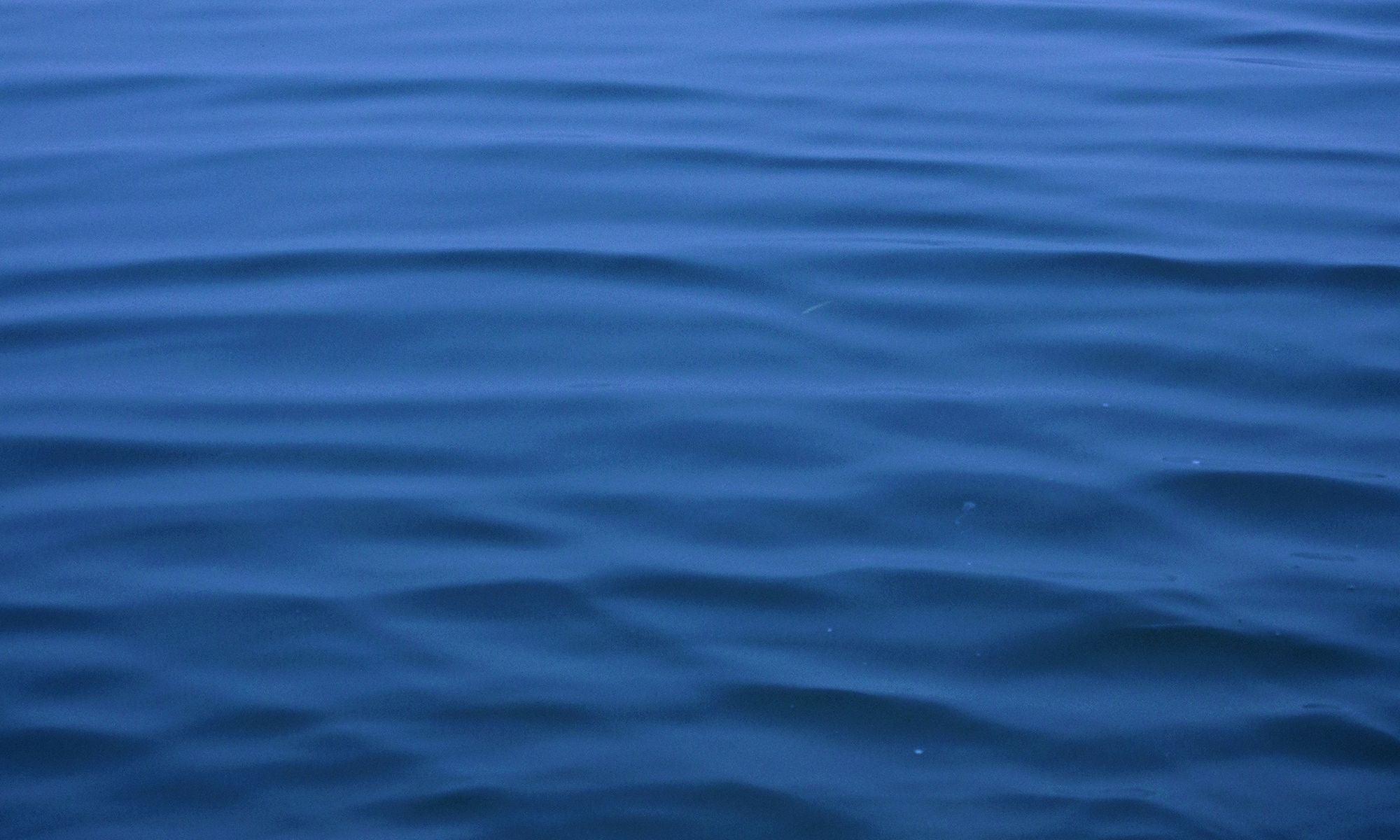

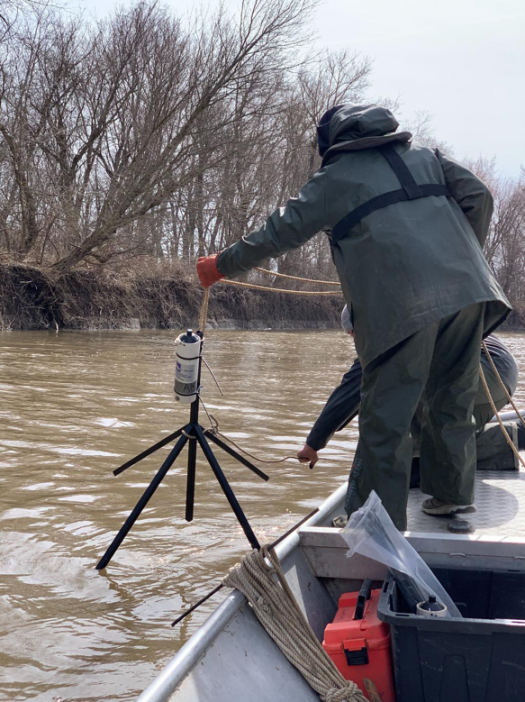 By Torri Leek
By Torri Leek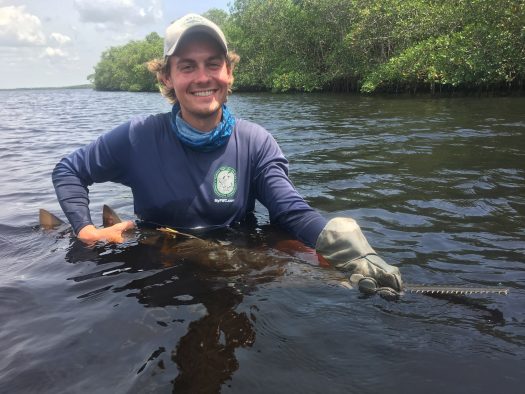
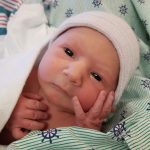 We have a new lab member! Liam James King was born on February 20th to SFEL researcher Sarah King and her husband Greg King, who works in a lab down the hall. A big welcome to this little prince.
We have a new lab member! Liam James King was born on February 20th to SFEL researcher Sarah King and her husband Greg King, who works in a lab down the hall. A big welcome to this little prince.